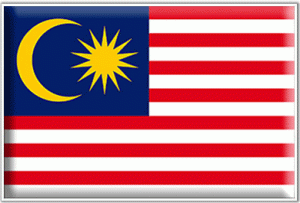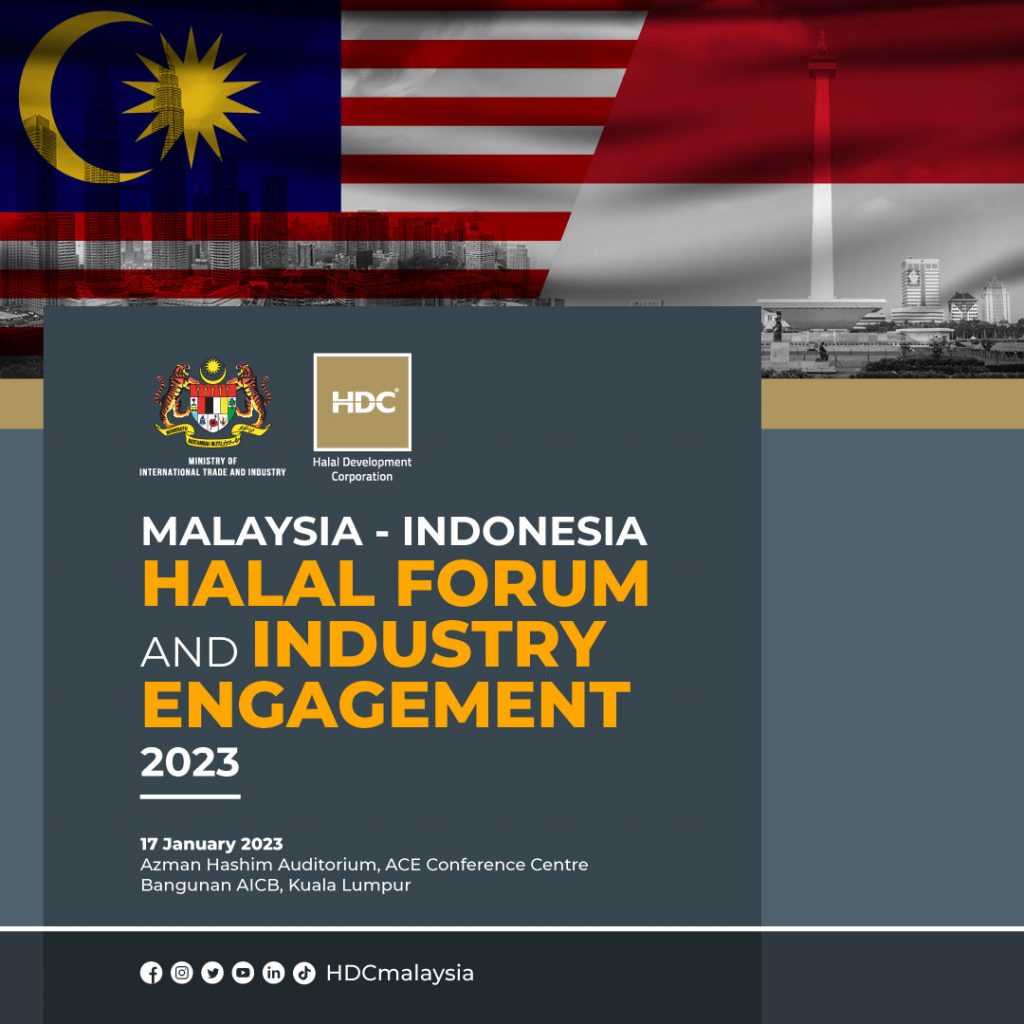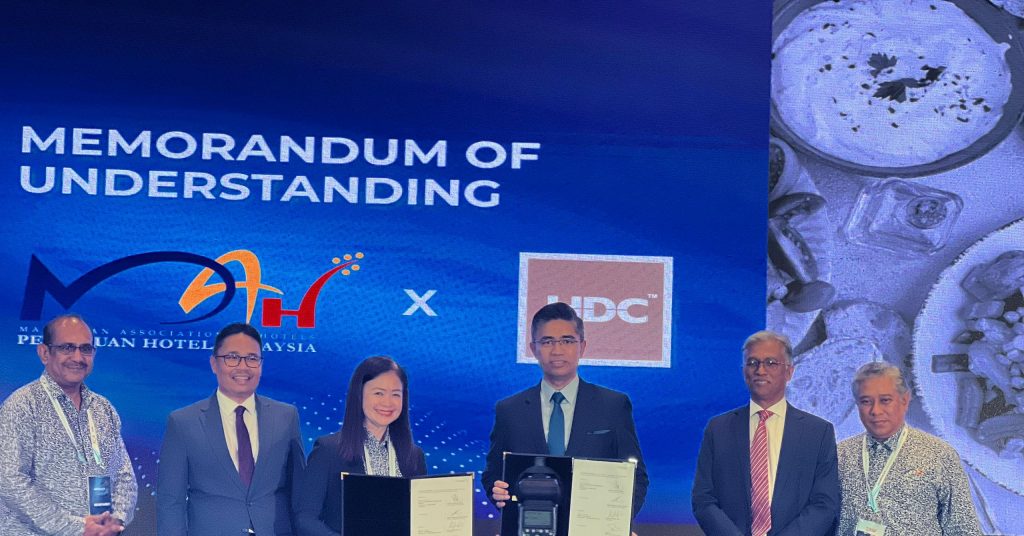Strong support from government and Halal organisations are a boost to the country’s manufacturing industries, writes CRISTINA DOUTHWAITE.
 MALAYSIA is seeking to increase its presence in the global Halal trade, which in 2013, stood at approximately $2.3 trillion. The country exports more than 40% of its Halal food and beverage products worldwide, and has seen a boom in other industries as well. Dato’ Dzulkifli Mamud, deputy CEO of the Malaysia External Trade Development Corporation (MATRADE), the government’s Halal promotional body, talks to FPMJ on trends and issues relating to the domestic market.
MALAYSIA is seeking to increase its presence in the global Halal trade, which in 2013, stood at approximately $2.3 trillion. The country exports more than 40% of its Halal food and beverage products worldwide, and has seen a boom in other industries as well. Dato’ Dzulkifli Mamud, deputy CEO of the Malaysia External Trade Development Corporation (MATRADE), the government’s Halal promotional body, talks to FPMJ on trends and issues relating to the domestic market.
How big is the local Halal industry?
The Halal industry in Malaysia is well established and not only limited to industrial products based on food and drink alone, but covers a larger sector including pharmaceuticals, cosmetics, healthcare, packaging, logistics, banking and finance, food processing and packaging machinery, tourism and other fields in the Halal ecosystem.
With the increasing awareness and demand for Halal products and services in Malaysia, various infrastructure to support these Halal sectors, such as the Halal industrial parks, Halal R&D and testing laboratories, traceability system and the standards and certification system, have been developed and are constantly being improved.
Amongst the big players are Nestlé, Unilever, Indofood, Ajinomoto, KFC Holdings, CCM Pharmaceuticals, Mamee, Munchies and Adabi Consumer Industries.
Where does Malaysia stand in terms of export?
Between January and September 2013, Malaysian Halal products exported amounted RM 24,007.58 million with the following breakdown:
40.8% are for food & beverage; 32.2 % are Halal ingredients; 14.4% are palm oil derivatives; 6.2% are for cosmetics and personal care; 5.2%, industrial chemical; and 1.1%, pharmaceuticals.
From January to September of last year, the top 10 export destinations were China (12%), Singapore (9.7%), United States (8.3%), Indonesia (6.2%), Netherlands (6.2%), Thailand (5.9%), Japan (5.6%), India (4.8%), South Korea (4.2%) and the Philippines (3.3%).
What is the projected growth for the country’s Halal industry?
The Halal concept is no longer seen as a religious obligation. Halal food products are in demand as they represent cleanliness, food safety and quality. The perception has revolutionised over time that many local food producers have shifted its food production or at least allocate a dedicated kitchen space that is Halal compliant.
There are amazing potentials in the international markets especially the Middle East. However, we do not disregard nontraditional markets such as Europe, India and China, which have a fast growing Muslim population. Europe has the third largest concentration of Muslims after Asia and African countries. Europe has much larger number of Muslims compared to North America, Australia/ Pacific and Latin America. In addition, European Muslims have a higher purchasing power, thus increasing the market potential. Chinese Halal market on the other hand is worth $2.1 billion and growing at 10% annually according to the Islamic Association of China.
Please describe the work that government and Halal organisations are doing to support manufacturers.
Various measures and programmes have been put in place to ensure the success of Halal initiatives in Malaysia. The Ministry of International Trade and Industry (MITI) has formulated strategies and is providing incentives to encourage trade and investment in Halal products and services. Incentives for investments include full tax exemption for the production of Halal ingredients, cold chain facilities and machinery and equipment. Through participation in various international fora, MITI will continue to enhance collaborations with OIC member countries to promote the Halal sector. In fact, strategies and plans on Halal development were included in the nation’s policy and planning initiatives.
The Halal Industry Development Corporation (HDC) was established in 2006 as the first government-backed Halal industry development corporation in the world, to coordinate the overall development of the Halal industry in an integrated and comprehensive manner.
What are the responsibilities of MATRADE in particular?
The Malaysia External Trade Development Corporation (MATRADE) is the national export promotion agency. Besides hosting and organising the Malaysian International Halal Show (MIHAS), under the auspices of MITI, MATRADE has always been at the forefront to explore new trade opportunities for local companies who seek market expansions for Halal products and services. In 2014 alone, MATRADE has identified 147 promotion activities involving 46 markets. These strategic promotional activities overseas includes participation in relevant trade fairs around the world, organising Malaysian Halal awareness programmes to selected markets, conducting publicity campaigns to attract both foreign exhibitors and trade visitors as well as organising buying mission programmes.
MATRADE is also working closely with local entrepreneurs to develop local products for export market, riding on Malaysia’s trade networks, infrastructure and know-how. MATRADE undertakes the role as export channel by introducing local companies to trade buyers, identifying opportunities and potential in outside markets, assessing the market and providing advice on international laws and regulations.
What are some of the programmes in place?
In facilitating the increasing need for Halal skilled and knowledgeable workers, more than 59,000 participants attended the HDC Halal Training Programmes on Halal Awareness, Halal Industry and Professional modules. The countries where Halal training has also been conducted include Australia, Kuwait, Korea, Japan and China.
Besides the development of the HDC Designated Park Guidelines, tax incentives in the form of 100% income tax exemption ranging from 5 to 10 years and exemptions on import duty and sales tax were provided for Halal park operators, Halal logistic operators and Halal industry players to encourage foreign and domestic investments in Halal.
The SME Corp, another agency under MITI provides matching grants to SMEs to promote Halal products. Activities covered relate to product development and product formulation, sample testing, acquisition of machinery and equipment, renovation renovation expenditures and other related costs for compliance to requirements of Halal certification and promotional activities.
To date, the government through Standards Malaysia has developed 12 Malaysian Standards (MS) on Halal. Besides the food standard, it has also been expanded to cover other Halal related industries including Halal Cosmetic and Personal Care, Halal Logistics and Halal Pharmaceutical. The latest MS 2200-2:2012 on use of animal bone, skin and hair is already available.
The Halal Industry Master Plan was developed in 2008 to steer the growth of the Halal industry. Its objective is to make Malaysia the Global Reference Centre for Halal Integrity know-how and to develop Malaysia as the global leader in the production, trade and innovation of Halal-related sectors.
How different is the Malaysian Halal certification from other countries?
Malaysia is the only country in the world whereby the government provides full support in promoting Halal certification process on products and services. Halal certification bodies in other countries are either developed by the individual provinces or states backed by their nongovernmental organisations (NGO).
JAKIM is a Malaysian government institution which established the Malaysia Halal logo and implemented Halal Certification System. It is the governing body that issues Halal certificate for local and export markets. It is also the monitoring and enforcement body for Halal guidelines.
Besides JAKIM, the State Islamic Religious Department (JAIN) and State Islamic Religious Council (MAIN) have the authority to issue the Halal certificates and logos for domestic market. The Halal certification is issued according to three categories of application: Product/Consumer Good, Food Premise and Slaughter House/ Abattoir.
Additionally, the premise inspection in terms of the product processing, handling, storage, equipment and distribution, is mandatory procedure before the Halal certificate is approved. The Halal certification will be issued after compliance of basic principle and procedure, and is revoked if not complied with.
The fact that Malaysian Halal certification incorporates good manufacturing practice (GMP) and good hygiene practice (GHP) gives confidence to the majority of Islamic countries to accept products that are certified Halal in Malaysia. This proves that certification is not only complying with Islamic tenets but also about global best practices.
What are the challenges producers faces in complying with Halal requirements?
The need to establish one global Halal standard is currently the most pressing issue within the Halal industry. The definitions of Halal, while generally agreed upon by Muslims, display significant gaps when it comes to their application in the industry. Due to differences in Halal standards not only between countries but also within each country (the UK for example have various certification agencies), confusion, misunderstanding and even abuse in the Halal logo could happen. There is plenty at stake for the Halal industry. The revocations of Halal certificate could easily translate into loss of revenue for manufacturers.
One of the reasons why the Halal industry cannot grow faster, despite rising demand for Halal products worldwide, is because there is no consensus on a Halal standard. Each country has its own certification body, which leads to disagreements over animal feed, slaughtering methods, packaging, logistics and other issues. This is actually a complex area for companies to navigate when trading Halal products globally. One exporting country’s Halal standard might not comply [with] the importing country’s standard.
Finding a middle ground or mutual understanding on the minimum core standard (zero tolerance) that we could all agree upon such as in pork and alcohol, would be a good start.
What efforts are being made to ensure the quality of Halal food?
Improving the quality of Halal food is similar as improving the quality of any food product for that matter such as its taste, packaging, ingredients, proper R&D, etc. What is critical is to ensure that the food produced remain Halal despite having to go through various manufacturing processes. For this, the first government-owned Halal analysis laboratory will be set up in Bandar Enstek, Negeri Sembilan. The new institute-level lab is managed by the Department of Islamic Development Malaysia (JAKIM). Malaysia is the first country to have such a facility as most labs for Halal and non-Halal products analysis are privately owned.
In addition, the first Halal Verified Engine (HVE) system has been set up by JAKIM. The data and revenue sharing system designed for all the recognised International Halal Certification Bodies (CBs) will simplify the verification for Halal ingredients or components in the supply chain from other countries, through the support and up-to-date information shared by CBs recognised by JAKIM.
What support is needed to enhance the growth of the local Halal industry?
The key to enhance the growth of the Malaysian Halal industry is to actually develop the local SMEs. SMEs play a vital role in Malaysian economy and are considered to be the backbone of the industrial development in the country. Many Malaysian Halal players are in fact micro-SMEs. However, despite various efforts put forth by the Malaysian government to develop these enterprises, many of them still struggle to survive in the local market, let alone international.
Emphasis on the following areas is crucial to ensure that these microSMEs could contribute significantly to the growth of Halal industry: human capital development, financing, technology adoption,raw materials and resources, and branding
What is your outlook for the Halal market?
Levels of awareness have increased and more and more manufacturers are delving into the Halal industry in a bigger way, especially from non-Muslim majority countries.
The rising middle-income class has also contributed to the expansion of the Halal industry.
More businesses are converting to produce Halal products and more companies have realised the importance of the Halal standard and its impact to the industry.



